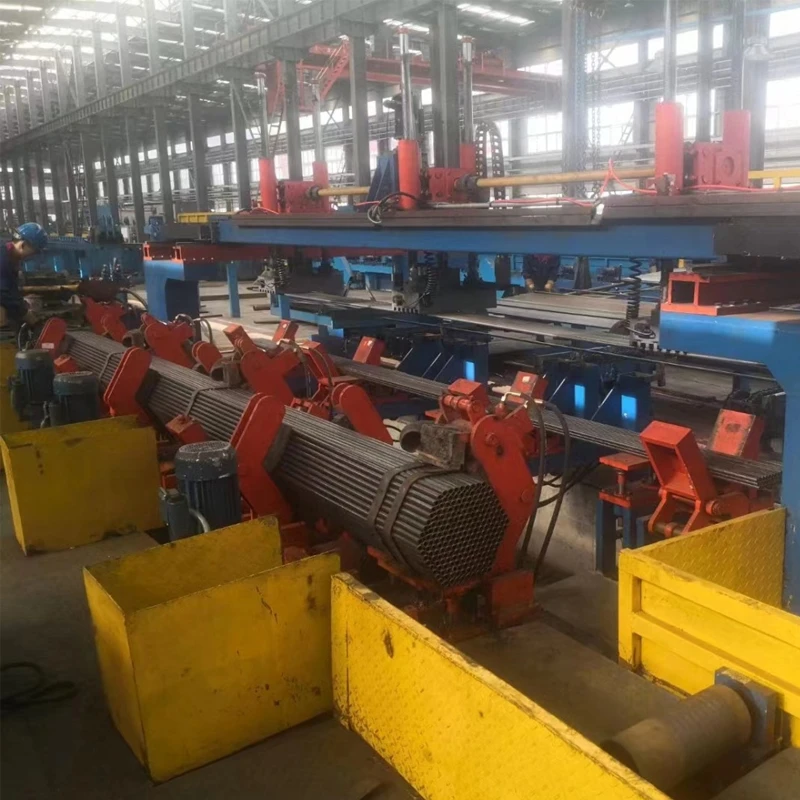tube forming machine manufacturers
Tube Forming Machine Manufacturers A Comprehensive Overview
In the ever-evolving world of manufacturing, tube forming machines play an essential role in various industries, including automotive, aerospace, construction, and more. These machines are designed to bend, cut, and shape metal tubes into precise configurations, allowing for the creation of components that are fundamental to modern engineering and design. In this article, we will explore the landscape of tube forming machine manufacturers, discussing key features, trends, and the future of this vital sector.
The Importance of Tube Forming Machines
Tube forming machines are crucial for producing a variety of products and parts. They are used to create components such as exhaust systems, handrails, and frames for vehicles. As industries demand more complex shapes and higher precision, the need for advanced tube forming technology has increased. Manufacturers now offer machines that can perform multiple tasks—such as bending, cutting, welding, and assembling—within a single unit, significantly streamlining the production process.
Key Players in the Market
The tube forming machine manufacturing sector comprises several notable companies that have established themselves as leaders in the industry. These manufacturers range from specialized small businesses to large multinational corporations. Some of the most prominent names include
1. Baileigh Industrial Renowned for its high-quality equipment, Baileigh offers a wide range of tube forming machines, including hydraulic and CNC tube benders. Their machines are known for their durability and ease of use, making them popular among both small workshops and large manufacturers.
2. Machinery Resources International This company focuses on high-performance tube and pipe processing equipment. They provide innovative solutions tailored to specific production needs, with a strong emphasis on technology and automation.
3. BLM Group An Italian manufacturer with a global presence, BLM Group specializes in laser technology and tube processing. They provide advanced automation solutions that integrate laser cutting and forming, which enhance efficiency and precision in manufacturing processes.
4. HGG Group HGG is known for its innovative 3D profiling technology for tubes and beams. Their machines are highly versatile and can cater to various industries, including shipbuilding and infrastructure.
These companies, among others, actively invest in research and development to advance their technology, pushing the boundaries of what tube forming machines can achieve
.tube forming machine manufacturers

Emerging Trends
As industries continue to evolve, several trends are shaping the tube forming machine market
1. Automation The integration of automation and robotics into tube forming processes is becoming more prevalent. Such systems improve efficiency, reduce manual labor, and enhance precision in production.
2. Green Manufacturing Sustainability is a growing concern in manufacturing. Tube forming machine manufacturers are increasingly focusing on energy-efficient machines and processes that minimize waste and reduce environmental impact.
3. Customization The demand for customized solutions is on the rise, as manufacturers seek to produce unique components for specialized applications. Companies are now offering machines that can handle a wider variety of materials, sizes, and shapes.
4. Smart Technologies The advent of Industry 4.0 has introduced the concept of smart manufacturing, where machines are equipped with sensors and connectivity features. This allows for better monitoring, predictive maintenance, and data analytics, ultimately leading to enhanced productivity.
The Future of Tube Forming Machines
The future of tube forming machine manufacturing looks promising. As technological advancements continue, we can expect to see more sophisticated machines that offer higher levels of automation, improved precision, and enhanced energy efficiency. Manufacturers will likely focus on developing versatile machines that can adapt to a wider range of applications, providing solutions to meet the diverse needs of modern industries.
Moreover, the increasing globalization of supply chains will drive tube forming machine manufacturers to expand their reach, collaborating with international partners to tap into emerging markets. Training and support services will also become critical as manufacturers seek to optimize their operations and ensure that their workforce is skilled in using advanced machinery.
In conclusion, tube forming machine manufacturers are pivotal in the manufacturing landscape, providing the tools necessary for creating essential components across various sectors. As innovation and technology continue to shape the industry, we can anticipate exciting developments that will redefine the capabilities and applications of tube forming machines.
-
High Frequency Straight Seam Welded Pipe Production Line-BzZhou Xinghua Machinery Equipment Manufacturing Co., LTD.|line pipe steel&welded gas pipeNewsJul.30,2025
-
High Frequency Straight Seam Welded Pipe Production Line-BzZhou Xinghua Machinery Equipment Manufacturing Co., LTD.|High Precision&Automated SolutionsNewsJul.30,2025
-
High Frequency Straight Seam Welded Pipe Production Line - BzZhou Xinghua Machinery Equipment Manufacturing Co., Ltd.NewsJul.30,2025
-
High Frequency Straight Seam Welded Pipe Production Line-BzZhou Xinghua Machinery Equipment Manufacturing Co., LTD.|Precision Welding, High EfficiencyNewsJul.30,2025
-
High Frequency Straight Seam Welded Pipe Production Line|BzZhou Xinghua|Precision Welding&EfficiencyNewsJul.30,2025
-
High Frequency Straight Seam Welded Pipe Production Line - BzZhou Xinghua|Precision Engineering&EfficiencyNewsJul.30,2025


